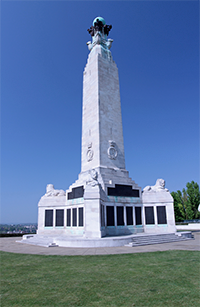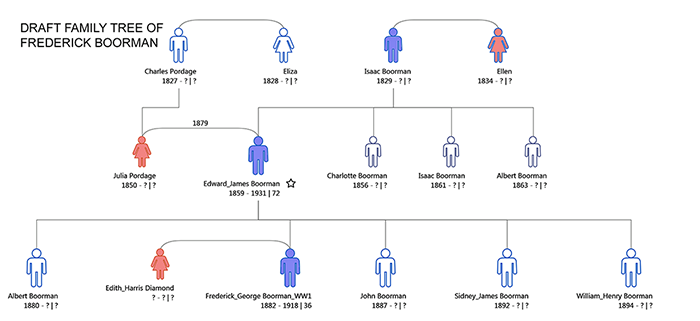First World War Project
Frederick George BOORMAN (of Oare)
b. 5th July 1882 Leading Seaman, Service Number B.4386 |

Born to local Labourer, Edward and Julia (née Pordage) on 5th July 1882. Baptised on 26th July 1882 in St Mary of Charity, Parish Church of Faversham. Edward and Julia were living at No.8 Thomas Square, Faversham at this time.
Frederick had one older brother, Albert, and three younger siblings, John, Sidney James and William Henry. The family originated from Lenham but settled in and around Faversham, Preston and Ospringe.
Distinctive marks included a scar on the right of his neck, four flags on left arm, and bird on right arm.
He stood at 5 feet, six inches; chest of 38 inches; brown eyes and fair complexion.
In the Census of 31st March 1901, Frederick Boorman is listed as a "Mate" aboard the coasting sailing barge, the "Sun" - the Master was Thomas Culver Waters. At this time the barge was operating out of Dock Head Pier, Albert Dock. When completed, the census document was returned to the Customs Officer, Tilbury Dock, London, Essex; sub-district, Canning Town; Registration District, West Ham. This sailing barge's home port was Rochester.
Between 9th July to 30th September 1903, Frederick was serving on "Dido" [Number X/9412]
Frederick's first date of Enrolment was 1st October 1906. Later, he was assessed and joined the Royal Naval Reserve (probably at Sheerness) on 30th December 1910. Frederick received his on-board training on the pre-Dreadnought HMS "Illustrious" until 26th January 1911. This ship was very 'long in the tooth' by this time (launched in Chatham in 1886) and restricted to Home Fleet duties until refitted in 1912. Probably returning landside to Sheerness, Frederick then continued his ship-board training aboard HMS "Implacable" between 27th November and 24th December 1912, also attached to the Home Fleet. His performance throughout his career was marked out as "Very Good". His Naval Record further included the assessment - "Recommended for promotion to Leading Seaman, Royal Naval Reserve. Certified Navally and Medically "fit" and fit for "retention".
The term "retention" meant that Frederick continued in his civil employment but could be called on at short notice to serve in HM ships. In return, he was paid a quarterly sum of £1 10s. up until 2nd August 1914 as a "Schedule 32 Retainer". This was a precautionary approach to any future need for rapid naval deployment in Home waters and Overseas. Nearly all his payments went through Faversham (only the first payment went to Poplar). The practical consequence was that, when war broke out, he was immediately appointed into the Reserve as a Leading Seaman - clearly a man exhibiting strong skills and experience.
In the meantime, in the second quarter of 1908, Frederick married Edith Harris Diamond. While Frederick was spending a life on the sea, Edith remained locally (Davington, Ospringe and Oare).
In the pre-war years, in the 1911 Census, Frederick is "Crew" (Mate) aboard the "Economy" at St George in the East, London & Middlesex. Frederick also served as Mate aboard barges "Henry" and "Sidney" out of Poplar and Victoria Docks on the Thames until October 1912. While "Sidney" is not much documented, "Henry" was a very sound barge, built in 1904 and remained in commercial use until 1949. Thereafter, "Henry" successfully competed in several Thames barge matches through the 1950s onwards.
From 1st April 1913, Frederick was a Ferryman at Elmley Ferry, Sittingbourne/Murston, before moving to Faversham "in motor boat towing Cotton Powder barge" from 4th October. The following year (6th April 1914), Frederick is a "Motorman - Cotton Powder Company, Uplees, Faversham."
The National Probate Calendar records: "BOORMAN, Frederick George of Davington Cottages, Davington near Faversham Kent, died 6 November 1918 at sea. Administration London, 16th August 1922 to Edith Scott (wife of Walter Edward Scott). Effects £812."
A War Gratuity of £50 was paid to Edith on 5th September 1922. [See Appendix 2]
Frederick was posthumously awarded the 1914 Star, Victory Medal, British War Medal. [See Appendix 1]
Military Experience of Frederick George Boorman
With the declaration of War, Frederick was appointed "Leading Seaman" on 1st October 1914 under naval terms aboard the recommissioned HMS "Bacchante" (Chatham) that went to the Mediterranean to move ANZAC troops in early 1915. In April 1915, Frederick is aboard the "Andros" out of Chatham; on 30th June 1915, Frederick is at HM Depot, Port Said, Egypt. On 16th November 1917, Frederick has left Egypt and is at Home (Pembroke I, Chatham Shore Base). From here, Frederick joined the "Janet" on 12th September 1918. Shortly thereafter, Frederick and his shipmates died at sea.
The dates are not given for his "previous service in Reserve" with numbers: X/9412, serving 3 years and 9 months; and A/493, serving 5 years.
Circumstances of the death of Frederick George Boorman
There are no records explaining the loss of the Schooner/Ketch "Janet". First "overdue" then "missing".
Extreme weather that intensified very swiftly may have played a fateful part as a small 74-ton vessel, heavily laden with coal bound for Kirkwall:-
During the night of the 4-5th a deep depression travelled rapidly from the South-West of Ireland, and by 7h. on the 5th was centred between Orkney and Shetland, the pressure at Lerwick falling to 971mb., the passage of this depression causing gales from between South and West in most parts of the British Isles. The rise of the barometer in the rear of this disturbance over the South of Scotland was unusually rapid. By 7h. on the 8th another depression of great depth was centred to the North-West of Stornoway, where the pressure was as low as 962 mb. (28.4 in.), the gradient being very steep between this point and Scilly, where the corresponding value was 1,012 mb. (29.9 in.). This system caused violent gales from the Westward on the North coast of Ireland, and from the South and South-East in the North of Scotland. The accompanying rain was slight or moderate, but was general, and in places there was hail. At some of the stations in the West of Scotland the week ended the 9th was considered to be the roughest of the year, great damage being done by wind and rain. At Gordon Castle, on the night of the 7th-8th, 5,000 trees were blown down, and, during this period, a wind of force 12 from the South-East was reported at the watchtower on Ander hill, Lerwick (at 7h on the 8th), and force 10 from the South at Wick.
[Source: Monthly Weather Report of the Meteorological Office. 43rd Year, Vol. 35. (New Series). "Contains public sector information licensed under the Open Government Licence v1.0"]
| The Nottingham Journal of 9th January 1919 |
| OVERDUE. Lloyd's report that the three following vessels are considered very much over-due:- Heathpark, of Greenock, 2,205 tons gross, Bilbao for Maryport; the Janet, schooner, of Kirkwall, 74 tons, Firth of Forth for Kirkwall; and the Uranus, brigantine, of Riga, 350 tons gross, Oporto for Bristol. |
| The Northern Whig of 16th January 1919 |
| Vessels Missing and Overdue. The three following vessels were posted at Lloyds to-day as missing:- The schooner Janet of Kirkwall, official number 89021, which left Leith for Kirkwall on November 4th with a cargo of coal; the brigantine Uranus of Riga, 350 tons gross, which left Oporto for Bristol on September 20th with a cargo of wine; and the steamer heathpark, of Greenock, official number 137050, which left Bilbao for Maryport on October 5th with a cargo of iron ore, and have not since been heard of. |
In the official records for Frederick, a Note to Edith at her home in No.3 Davington Cottages, Davington Road, Faversham states: "9th December 1918. A.G.N.- Reporting that the Schooner Janet has not been reported since leaving the Forth for Kirkwall on 6 November 1918, and is feared lost with all on board. In these circumstances, Boorman who was serving on Board must for the present be regarded as missing."
The War Graves Rolls recorded that Frederick's body was not recovered for burial, nor was the location of the foundered ship known. The cause of death was left 'open', stating that he was "killed or died by means other than disease, accident or enemy action." The working assumption being that sea conditions overwhelmed the ketch and all hands were lost. On 13th March 1919, Edith was notified at her home of No.3 Davington Hill Cottages, Faversham, Kent. Frederick was officially removed from the strength of the Navy on 22nd March 1919.
In one note of 1st June 1921, Edith is living at 2 Windmill Road, Oare, Faversham.
Another note of 13th January 1923, we see Edith Scott, living at 90 Chamberlain Road, Angel Road, Norwich. After an interim payment of £13, the balance of £19 was paid to Edith as "Naval Prize Money owed." on 23rd February 1923.


 World War 1 Pages
World War 1 Pages